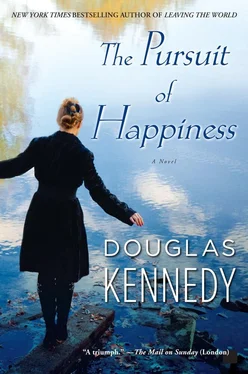'I don't know...'
'It will. I promise'.
'Never promise anything'.
'Why not?'
'Because you open up the prospect of disappointment. And because - now that Dorothy knows - things will change between us. Change is always unsettling'.
'I won't let things change between us'.
'They will, my love. Because we'll be no longer living in fear of discovery'.
'But that's a good thing'.
'Agreed', then I added: 'But it will never be as romantic, will it?'
At Washington, we immediately checked into a hotel and made love. We made love again late that night. And the next night in Baltimore. And the night after that in Wilmington. We returned to Manhattan. We shared a cab uptown. He dropped me at my apartment. He kissed me long and hard. He promised to call me tomorrow.
He kept his promise, phoning me the next afternoon from work. I asked him how he was greeted at home yesterday. I could hear him choose his words with care.
'She was happy to see me'.
'No questions asked about out of town... ?'
'None whatsoever'.
'How's Charlie?'
'Wonderful'.
'Did you sleep with her?' I suddenly heard myself asking.
'Sara...' he said, trying to sound patient.
'I need to know'.
'We shared the same bed'.
'Cut the crap, Jack'.
'She wanted to, so...'
'You had no choice. Oops! Miss Sarcastic strikes again'.
'You shouldn't ask me about that'.
'You're right. I shouldn't. It's self-injurious and self-defeating. Like being in love with a married man. Can you come over now?' I asked, cutting him off.
'Now?'
'Yes. Now. Because I need you now'.
He walked through my door thirty minutes later. An hour afterwards, he jumped up from my bed, and made a fast telephone call, informing some client that he was running ten minutes late. As he dressed, he said, 'I'm out of town tomorrow'.
'Whereabouts?'
'Hartford and Springfield, allegedly. But I could actually be here - if that fits in with your schedule'.
'I'll see if I can move a few things around'.
When he showed up the next night, he had a large suitcase with him.
'I just thought I might leave a few things here. If that's all right'.
'I suppose you'd like your very own closet'.
'That would be handy'.
That night, he unpacked two suits, two pairs of shoes, three shirts, and several changes of underclothes. His umbrella soon found a home next to mine in a stand by the front door. A spare overcoat ended up in his closet. So too did a raincoat and one of his favorite snap-brim hats. Gradually, a complete second wardrobe appeared in my spare closet. His bathrobe hung next to mine on the back of the bedroom door. His shaving cream, brush and razor monopolized a corner of the bathroom sink. His ties dangled off the closet doorknob (until I bought him a tie rack). There were two spare cartons of Chesterfields in a kitchen cabinet. There were bottles of Ballantine Ale (his favorite) in the ice box. There was always a fifth of Hiram Walker in the living room.
He now lived here.
Or, at least, he lived here two days a week. The other two days, he was legitimately out of town. Traveling north to the more dismal corners of New England (Worcester, Lowell, Manchester). Or west to the Rust Belt cities of Pennsylvania. Or south on the Philadelphia-Washington axis. Some weeks, I would pack my Remington and accompany him on these journeys (though, snob that I am, I generally stuck to the Washington or Philadelphia runs). On Friday night, he would return home to Dorothy and Charlie. Though he would make a point of calling me daily (always from a phone booth), I wouldn't see him again until Monday. Initially, I didn't like this long three-day absence. Within a month or so, however, I began to appreciate the symmetry of our domestic schedule. I loved being with Jack. I loved his camaraderie. I loved having him in my bed. I was never bored in his company. He made me happy.
But I also came to like the fact that, come the weekend, my privacy would be returned to me. As I had discovered during my brief, wretched marriage to George, I was not a natural cohabiter. Even with Jack - a man I adored - there was a part of me which was pleased to see him leave on Friday, because it meant that, for three entire days, my life would be unencumbered. I could move at my own speed, set my own schedule, not worry about the needs of someone else. Yet, by Sunday night, I'd be desperate to see him again. And, come Monday at six, I'd start listening for him - waiting to hear the front door open (he now had his own set of keys), and the key to turn in my lock.
I also came to accept that this was, verily, an arrangement. Because unlike a conventional marriage, our relationship was conducted within strict parameters. We knew when we could (and couldn't) see each other. I never called him at the office. I never called him at home. I had him for a set time each week. If I wanted, I could extend that time by accompanying him out of town. Come Friday, he was no longer mine. But rather than mourn his seventy-two-hour absence, I quickly recognized it as something of a gift. In many ways, the arrangement suited me perfectly - and afforded me benefits (in terms of personal latitude and basic time to myself) that eluded most married women. More tellingly, I didn't have to engage in the power struggle which so defines most marriages. Our arrangement - the deal we struck between ourselves (without ever properly verbalizing it) - operated according to a very simple principle: no one was in charge here. No one was the head of the household. No one played the role of the breadwinner and of the little woman at home. We were equals.
Of course, we both fought like hell. But as the arrangement deepened, the arguments shifted away from the emotional complexities of my truncated life with Jack. As I had told him that night in Albany (and as I well knew myself): the moment a romance becomes bogged down in endless discussions about its inherent problems is also the moment that it ends up being labeled terminal.
So, we steered clear of such issues. Naturally, I would always ask after Dorothy and Charlie. Every time his son was mentioned in conversation, I'd get that twinge of loss which accompanied all thoughts about my inability to have children. Jack was sensitive to this - and, on several occasions, deliberately dodged my questions about his son. But I'd force the issue, telling him that I wanted to know about Charlie's progress... especially as he was everything to Jack.
Three months into our arrangement, the thought struck me one day that whenever we argued, it was usually about non-personal matters: like whether we really should be defending a police state like South Korea.
'Look', Jack said, 'that sonofabitch who runs South Korea... what's his name?'
'Sygman Rhee'.
'Right - well, there's no doubt that Rhee is a complete totalitarian. But at least he's our totalitarian'.
'There, you admit it. He's a repressive dictator. And though I have nothing but contempt for Stalin and his North Korean stooge, should we really be propping up totalitarian regimes?'
'Will you listen to yourself. You sound like some Adlai Stevenson liberal...'
'I am an Adlai Stevenson liberal'.
'Which essentially means that you have a nice soft-centered view of the world. You should learn some basic realpolitik. As Chamberlain discovered to his horror, appeasement gets you nowhere'.
'Oh, please don't give me your tough-guy view of foreign policy. "Speak quietly, but carry a big stick" might have worked for Teddy Roosevelt - but these days, the big sticks are atomic bombs... which happen to scare the hell out of me'.
'Listen, force is the only thing that any aggressor understands. General MacArthur's right: if we want to end the Korean conflict tomorrow, we should let North Korea and China sample our atomic bombs, then bring in Chiang Kai-shek to run the whole show'.
Читать дальше












